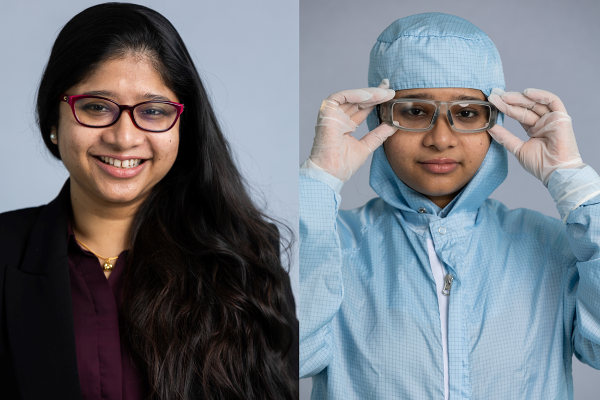
Meet Dr Rajasree Das, a Post-Doctoral Researcher at Tyndall who is one of the many women who ‘gown up’ daily to work in our state-of-the-art cleanroom facilities. A cleanroom is a controlled environment where pollutants like dust, airborne microbes and aerosol particles are filtered out in order to provide the cleanest area possible. This level of cleanliness is important as the nanomaterials Rajasree and her team work with are so small that even a speck of dust could destroy them. Rajasree tells us more about her research, working in the cleanroom and her advice for young women considering a career in science.

Post-Doctoral Researcher,
Tyndall National Institute.
What is your current role and research area?
I am a postdoctoral researcher for the Integrated Magnetics Group at Tyndall. At present, I am involved with four industry-funded research partnerships where I am responsible for material characterisation and fabrication work in the cleanroom facility. Our group is working on developing magnetics on silicon and magnetics in laminate technologies that enable the fabrication of highly miniaturised magnetic devices that can be incorporated into power supplies. The Integrated Magnetics Group in Tyndall are world leading in this area. I am also managing and delivering project tasks which demand high-impact journal publications and intellectual property capture, both know-how and patents.
What path led you here?
It started in 2001, I was one of only a few girls in the small town in India where I am from, who chose to study science. Nevertheless, I was very fortunate to have mentors in my life who encouraged me to break the gender, geographical and language barriers to pursue higher studies in Physics. In particular, my PhD supervisor, Professor Kalyan Mandal motivated me, included me on stretch projects, and recommended me for academic collaborations at a very early stage of my PhD. That helped me to shape my career. Later, I continued my research work with various groups in NTU in Taiwan and NUS in Singapore. I joined Tyndall in 2021 as it is one of the rare Institutes where you can find a perfect blend of academic and industrial research. The idea of leading projects from concept to manufacturing fascinates me and that is possible at Tyndall. Being a working mom who loves to challenge herself every day, it is not easy but I am happy to say I have found a good work-life balance here at Tyndall.
Did you have a role model who influenced your study/career choice?
I was blessed to find my role model in my grandmother, she taught me to be strong and stand by my decision. She used to explain events scientifically within her limited knowledge and would encourage me to read books and come up with a proper explanation. That helped me to build an appetite for science at a very early age. Very often, she used to sing a song written by Nobel laureate Bengali poet, Rabindra Nath Tagore, called “Jodi Tor Dak Shune Keu Na Ase Tobe Ekla Cholo Re (If no one responds to your call, then go your own way alone)" and the lyrics always gave me courage to step out of my comfort zone.
What does working in a cleanroom involve?
As an experimental physicist, I enjoy the stimulating working environment in the cleanroom facility at Tyndall. We have access to excellent device fabrication, testing, and characterisation facilities which open up opportunities for cutting-edge research. However, we do have to comply with the stringent policies, guidelines, and regulatory requirements. Sometimes it is rigorous and time consuming, but it is not hard. Maintaining a clean and organised work area is very important. In order to limit and control the airborne particles (contamination), we are required to wear a protective suit at all times. We have to be systematic to ensure top-quality processes and products.
What could be done to support women in STEM and #BreakTheBias (International Women's Day theme for 2022)?
Around the world, women make up only a small fraction of the STEM workforce. In addition to the work Institutes and Universities are already doing to promote gender equality in STEM, I would also recommend having a mentor or someone experienced in a similar field to guide early-career or young researchers to make the right decisions in terms of collaboration, funding and accessing facilities.
What advice would you give to young women considering a career in science?
Dream big, plot out the milestones to get there, put in the work but never be rigid about the path. Work towards your dream on your own terms regardless of how impossible it seems at times. Give yourself enough time to learn as much as possible, not as little as you can get away with it! As women, our lives are restricted in many ways, but once we know “why”, the “how” will follow. Please do not underestimate yourself, if you do not believe in your dreams, no one else will. The most important thing that I have learnt from working with various groups in different countries, having different work cultures and social infrastructures, is that you will be known and respected only for your work, nothing else.
